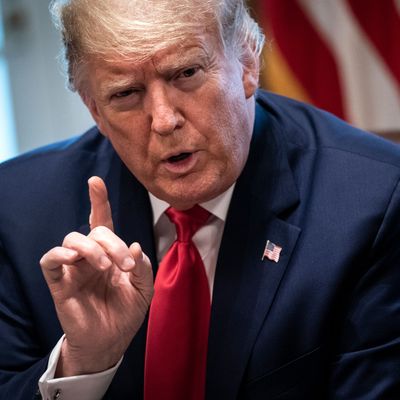
In 1941, the Soviet Union had a two-year-long nonaggression pact with Nazi Germany. Joseph Stalin not only refused to believe intelligence suggesting an imminent German attack, but treated any reports of such a threat as a hostile plot. (When a German soldier defected and reported the coming invasion, Stalin had him shot.) The Red Army suffered devastating losses because its officials were terrified to convey accurate reporting of the threat they faced.
President Trump’s response to the coronavirus is similar in kind, though obviously not in degree. He has minimized the scale of the threat, and deemed any evidence to the contrary as an act of political subversion, thus intimidating his own bureaucracy into toeing his line. Of course nobody has been arrested or shot, but the effect has nonetheless been felt. The New York Times reports that Trump’s Defense Secretary, Mark Esper, has instructed commanders “not to make any decisions related to the coronavirus that might surprise the White House or run afoul of President Trump’s messaging.” The Defense Department is literally subordinating the protection of its personnel to the president’s messaging whims.
Trump’s incentive, as always, is absolutely transparent, like watching a simple machine encased in glass. He is perfectly amoral and projects his amorality onto others. Under the Obama administration, he wildly and recklessly hyped the Ebola threat to discredit the administration for political gain, and has assumed his own opponents will naturally do the same to him. He has therefore focused on minimizing the coronavirus threat and demanded his administration do the same.
It is easier for Trump to take a purely political view of the problem when he has trouble understanding even the basic medical facts. Yesterday Trump — on camera! — wondered if a vaccine could also have a treatment:
And he asked if they can just use regular flu vaccine for the coronavirus:
What about just giving everybody Robitussin? That could work!
Trump has called attacks on his management of the crisis “their new hoax,” and repeatedly emphasized the sunniest aspects of the situation. Privately he has raged at experts within his administration for publicly admitting that the coronavirus may spread. He has suggested vaccines will be available sooner than any expert believes possible. News reports have depicted the administration as paralyzed, in part because its members fear that disseminating accurate information will make them targets for Trump’s purge of suspected deep state saboteurs. “Senior officials contend that [Health and Human Services Secretary Alex] Azar is operating under fear of offending Trump or his allies, which has led him to keep Adams, Hahn and his other underlings on a tight leash, while jockeying for credit to stay in the president’s good graces,” reports Politico. “It’s complete chaos,” a senior administration official tells the Washington Post.
Anthony Fauci, the well-respected infectious disease expert and veteran of half a dozen presidential administrations, gave a telling interview to Politico. “You don’t want to go to war with a president,” he said. “But you got to walk the fine balance of making sure you continue to tell the truth.” Note the implied tension between his competing desire to tell the truth and avoid going to war with the president.
It takes a lot to ruin a country, and even after three years of Donald Trump, the federal bureaucracy is still functioning. But it is harder to manage a technical problem of any kind in an atmosphere where the president distrusts technical expertise and reduces all questions to political loyalty. There is a reason authoritarian regimes often mismanage crises. The same principle can hold true with democratic regimes saddled with aspirationally authoritarian leaders.






























